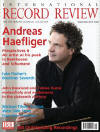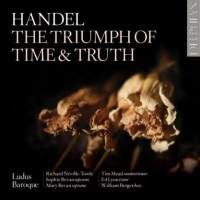Texte paru dans: / Appeared in:
*

International Record Review - (09//2014)
Pour
s'abonner / Subscription information
Delphian
DCD34135

Code-barres / Barcode : 0801918341359
In considering The Triumph of Time and Truth one has to go back to Handel's years in Rome, when he wrote the oratorio Il Trionfo del Tempo e del Disinganno in 1707. Thirty years later he returned to it, revising to the extent of adding music: 'beefed up', writes Peter Smaill in his essay with this set. In 1757 came a further revision, to English words. Handel, as was his wont, took much music from other compositions, examples being the chorus 'Comfort them, O Lord' from the Foundling Hospital Anthem of 1749 and pieces from his opera Lotario and the serenata Il Parnasso in Festa.
Richard Neville‑Towle and his Ludus Baroque plus soloists Sophie Bevan, Ed Lyon and William Berger also took part in Delphian's issue of Alexander's Feast, which I reviewed in March 2011. Joining them for this present recording are Mary Bevan and Tim Mead.
The character of Beauty bemoans the power of Time and looks to Pleasure for support, with the intervention of Deceit. Time and Counsel (or Truth)tell her to be realistic. Persuaded by ther advice she sings in the final aria the words 'Let no more this world deceive me/Nor let idle passions grieve me/ Strong in faith, in hope, in love'. Anyone thinking that ladies are favoured in that Beauty is a soprano be aware that Deceit is one too.
In this performance Ludus Baroque is formed of 11 strings, 8 wind players, a timpanist and Jan Waterfield playing harpsichord and organ. They make a lovely sound, much better, I am sure, than Neville-Towle's Really Terrible Orchestra, 'a celebrated community orchestra which encourages participation regardless of musical ability'. (Delphian has not announced any recordings there.)
The revisions for the Covent Garden Theatre performances in 1757 were not the last word, for in 1758 Handel turned to the work again, adding the chorus 'Comfort them, O Lord' and five arias, four of which were for Deceit and one, 'Sorrow darkens ev'ry feature', which is listed in Delphian's booklet as for Beauty but is actually sung by Pleasure. Smaill's note is not helpful, leaving one to assume that it is the 1758 version which was recorded in Edinburgh's Canongate Kirk with clear sound. Hyperion's release states that that is the 1757 score, so those five arias and chorus are not performed, which gains a few extra points for Delphian's choice, though the older set also boasts an impressive quintet of vocal soloists, creating difficulty when one tries to make a choice between the teams.
What excellent orchestration Handel wrote for much of this music, be it for the oboe in the final aria, 'Guardian angels, oh, protect me', or for the bassoon chugging along its merry way in Deceit's 'Melancholy is a folly'. In this recording, however, the oboe is rather too loud and partially responsible for the aria being the only one in which the words are not clear. For almost all the time one hears them easily, though I wish that Lyon had not been the only singer to avoid the rolled Y, a device which gives no help to the enunciation but is musically intrusive. It is not like a Scottish or Lancastrian rolled Y but is affected and unnatural. (Please do not bother to write if you disagree, for my view will not change.)
As I have just mentioned Lyon, let me consider him first. He is someone who has impressed me since the first time I heard him, on a Royal Academy CD (RAM023), on which he sings six songs (Berger is there too). Since then, Lyon's voice appears to have filled out, and the Canongate acoustic seems to have added a slightly hard veneer, but expectedly he sings well. For but one example, try Pleasure's last aria, 'Like clouds, stormy winds then impelling'. Lyon strongly conveys Pleasure's disleasure, as in the lines 'Disdainful I fly in resentment' and 'Truth drives me to despair', while cleanly negotiating Handel's divisios. Berger also manages the tricky passages, but his tone here has taken on an abrasiveness down below, contrary to the rounder tones higher
in his range. As Time's mate, Counsel, Tim Mead is rich in the dark timbre employed in 'Pensive sorrow, all‑possessing' and even more so in 'Mortals think that Time is sleeping', a marvellous slow aria that nevertheless demands that the singer has the reserve of breath to overcome the difficulties of the long melismas. Mead has and delivers them on a steady line.
The Bevan sisters also give pleasure. Sophie has the larger tone here and has to contend with a generally higher tessitura, dealing on equal terms with slow and fast music, being on good form in whichever piece one chooses to listen to. Her voice has an open sound, adding a dramatic touch when needed. Mary's tone is of a narrower bore, as it were, but a shade warmer, produced on a pleasingly flowing line. Try her in the lyrical 'Pleasure's gentle Zephyrs playing'.
Neville‑Towle and Ludus Baroque provide as much enjoyment as in Alexander's Feast.
There is also Handel's Ode
on St Cecilia's Day (also Delphian, which I reviewed in
October 2012), with Mary Bevan and Lyon. Keep an eye on this Ludus Baroque/Delphian
partnership.
Fermer la fenêtre/Close window
Cliquez l'un ou l'autre
bouton pour découvrir bien d'autres critiques de CD
Click either button for many other reviews


